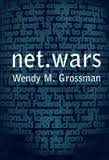
In the United States, freedom of speech and expression is strongly protected from government restrictions by the First Amendment to the United States Constitution, many state constitutions, and state and federal laws. Freedom of speech, also called free speech, means the free and public expression of opinions without censorship, interference and restraint by the government. The term "freedom of speech" embedded in the First Amendment encompasses the decision what to say as well as what not to say. The Supreme Court of the United States has recognized several categories of speech that are given lesser or no protection by the First Amendment and has recognized that governments may enact reasonable time, place, or manner restrictions on speech. The First Amendment's constitutional right of free speech, which is applicable to state and local governments under the incorporation doctrine, only prevents government restrictions on speech, not restrictions imposed by private individuals or businesses unless they are acting on behalf of the government. However, laws may restrict the ability of private businesses and individuals from restricting the speech of others, such as employment laws that restrict employers' ability to prevent employees from disclosing their salary with coworkers or attempting to organize a labor union.
Prior restraint is censorship imposed, usually by a government or institution, on expression, that prohibits particular instances of expression. It is in contrast to censorship which establishes general subject matter restrictions and reviews a particular instance of expression only after the expression has taken place.
The Turn the Web Black protest, also called the Great Web Blackout, the Turn Your Web Pages Black protest, and Black Thursday, was a February 8–9, 1996, online activism action, led by the Voters' Telecommunications Watch and the Center for Democracy and Technology, paralleling the longer-term Blue Ribbon Online Free Speech Campaign organized by the Electronic Frontier Foundation. It protested the Communications Decency Act (CDA), a piece of "rider" legislation for Internet censorship attached to the Telecommunications Act of 1996, and passed by the United States Congress on February 1, 1996. Timed to coincide with President Bill Clinton's signing of the bill on February 8, 1996, a large number of web sites had their background color turned to black for 48 hours to protest the CDA's curtailment of freedom of expression. Thousands of websites, including a number of major ones, joined in the protest. The campaign was noted by major media such as the CNN, Time magazine and The New York Times.
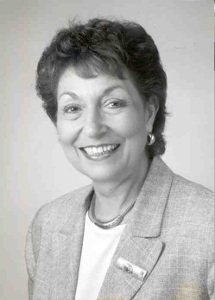
Judith Fingeret Krug was an American librarian, freedom of speech proponent, and critic of censorship. Krug became director of the Office for Intellectual Freedom at the American Library Association in 1967. In 1969, she joined the Freedom to Read Foundation as its executive director. Krug co-founded Banned Books Week in 1982.
Freedom of the press in the United States is legally protected by the First Amendment to the United States Constitution.

Marjorie Heins (b.1946) is a First Amendment lawyer, writer and founder of the Free Expression Policy Project.
National Socialist Party of America v. Village of Skokie, 432 U.S. 43 (1977), arising out of what is sometimes referred to as the Skokie Affair, was a landmark decision of the US Supreme Court dealing with freedom of speech and freedom of assembly. This case is considered a "'classic' free speech case" in Constitutional law classes. Related court decisions are captioned Skokie v. NSPA, Collin v. Smith, and Smith v. Collin. The Supreme Court ruled 5–4, per curiam. The Supreme Court's 1977 ruling granted certiorari and reversed and remanded the Illinois Supreme Court's denial to lift the lower court's injunction on the NSPA's march. In other words, the Courts decided a person's assertion their speech is being restrained must be reviewed immediately by the judiciary. By requiring the state court to consider the neo-Nazis' appeal without delay, the U.S. Supreme Court decision opened the door to allowing the National Socialist Party of America to march.
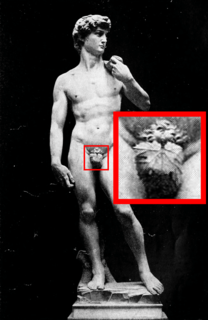
Censorship is the suppression of speech, public communication, or other information, on the basis that such material is considered objectionable, harmful, sensitive, or "inconvenient." Censorship can be conducted by governments, private institutions, and other controlling bodies.
Leisa Goodman is an American official of the Church of Scientology. As of 2005, she served as the Human Rights Director for the Church of Scientology International. She had previously served as a spokesperson for the Church and served as its media relations director.
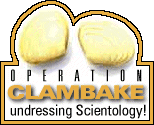
Operation Clambake, also referred to by its domain name, xenu.net, is a website and Norway-based non-profit organization, launched in 1996, founded by Andreas Heldal-Lund, that publishes criticism of the Church of Scientology. It is owned and maintained by Andreas Heldal-Lund, who has stated that he supports the rights of all people to practice Scientology or any religion. Operation Clambake has referred to the Church of Scientology as "a vicious and dangerous cult that masquerades as a religion". The website includes texts of petitions, news articles, exposés, and primary source documents. The site has been ranked as high as the second spot in Google searches for the term "Scientology".

Freedom of speech is a principle that supports the freedom of an individual or a community to articulate their opinions and ideas without fear of retaliation, censorship, or legal sanction. The term "freedom of expression" is sometimes used synonymously but includes any act of seeking, receiving, and imparting information or ideas, regardless of the medium used.

Cyber Rights: Defending Free speech in the Digital Age is a non-fiction book about cyberlaw, written by free speech lawyer Mike Godwin. It was first published in 1998 by Times Books. It was republished in 2003 as a revised edition by The MIT Press. Godwin graduated from the University of Texas School of Law in 1990 and was the first staff counsel for the Electronic Frontier Foundation. Written with a first-person perspective, Cyber Rights offers a background in the legal issues and history pertaining to free speech on the Internet. It documents the author's experiences in defending free speech online, and puts forth the thesis that "the remedy for the abuse of free speech is more speech". Godwin emphasizes that decisions made about the expression of ideas on the Internet affect freedom of speech in other media as well, as granted by the First Amendment to the United States Constitution.
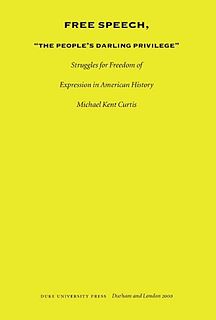
Free Speech, "The People's Darling Privilege": Struggles for Freedom of Expression in American History is a non-fiction book about the history of freedom of speech in the United States written by Michael Kent Curtis and published in 2000 by Duke University Press. The book discusses the evolution of free speech in the U.S. within the context of the actions of individuals and how they affected change. The author writes that protests and actions by citizens helped to evolve the notions surrounding free speech in the U.S. before definitive statements on the matter from U.S. courts. Curtis writes that free speech rights were first developed in "the forum of public opinion", and that, "The history of free speech shows the need for broadly protective free speech rules applied generally and equally".

Internet and Technology Law Desk Reference is a non-fiction book about information technology law, written by Michael Dennis Scott. The book uses wording from legal cases to define information technology jargon, and gives citations to individual lawsuits. Scott received his B.S. degree from Massachusetts Institute of Technology and graduated with a J.D. from the University of California, Los Angeles. He has taught as a law professor at Southwestern Law School. The book was published by Aspen Law and Business in 1999. Multiple subsequent editions were published under the imprint Aspen Publishers. Internet and Technology Law Desk Reference was recommended by the Cyberlaw Research Resources Guide at the James E. Rogers College of Law, and has been used as a reference in law journals including University of Pennsylvania Journal of International Economic Law, and Berkeley Technology Law Journal.
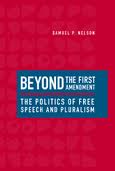
Beyond the First Amendment: The Politics of Free Speech and Pluralism is a book about freedom of speech and the First Amendment to the United States Constitution, written by author Samuel Peter Nelson. It was published by Johns Hopkins University Press in 2005. In it, Nelson discusses how the more general notion of free speech differs from that specifically applied to the First Amendment in American law.

Freedom of Expression® is a book written by Kembrew McLeod about freedom of speech issues involving concepts of intellectual property. The book was first published in 2005 by Doubleday as Freedom of Expression®: Overzealous Copyright Bozos and Other Enemies of Creativity, and in 2007 by University of Minnesota Press as Freedom of Expression®: Resistance and Repression in the Age of Intellectual Property. The paperback edition includes a foreword by Lawrence Lessig. The author recounts a history of the use of counter-cultural artistry, illegal art, and the use of copyrighted works in art as a form of fair use and creative expression. The book encourages the reader to continue such uses in art and other forms of creative expression.

Freedom for the Thought That We Hate: A Biography of the First Amendment is a 2007 non-fiction book by journalist Anthony Lewis about freedom of speech, freedom of the press, freedom of thought, and the First Amendment to the United States Constitution. The book starts by quoting the First Amendment, which prohibits the U.S. Congress from creating legislation which limits free speech or freedom of the press. Lewis traces the evolution of civil liberties in the U.S. through key historical events. He provides an overview of important free speech case law, including U.S. Supreme Court opinions in Schenck v. United States (1919), Whitney v. California (1927), United States v. Schwimmer (1929), New York Times Co. v. Sullivan (1964), and New York Times Co. v. United States (1971).
The William O. Douglas Prize is given by the Commission on Freedom of Expression of the Speech Communication Association to honor those who contribute to writing about freedom of speech. The Award is named after William O. Douglas, who served as an Associate Justice of the Supreme Court of the United States from 1939 to 1975.

Not in Front of the Children: "Indecency," Censorship, and the Innocence of Youth is a non-fiction book by attorney and civil libertarian Marjorie Heins about freedom of speech and the relationship between censorship and the "think of the children" argument. The book presents a chronological history of censorship from Ancient Greece, Ancient Rome and the Middle Ages to the present. It discusses notable censored works, including Ulysses by James Joyce, Lady Chatterley's Lover by D. H. Lawrence and the seven dirty words monologue by comedian George Carlin. Heins discusses censorship aimed at youth in the United States through legislation including the Children's Internet Protection Act and the Communications Decency Act.
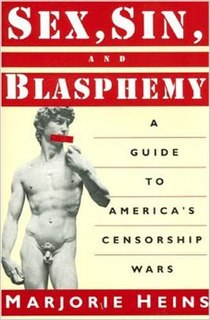
Sex, Sin, and Blasphemy: A Guide to America's Censorship Wars is a non-fiction book by lawyer and civil libertarian Marjorie Heins that is about freedom of speech and the censorship of works of art in the early 1990s by the U.S. government. The book was published in 1993 by The New Press. Heins provides an overview of the history of censorship, including the 1873 Comstock laws, and then moves on to more topical case studies of attempts at suppression of free expression.
